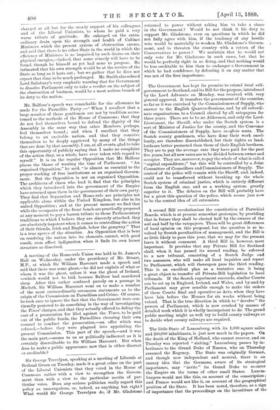A second Bill revolutionises the constitution of Parochial Boards, which
is at present somewhat grotesque, by providing that in future they shall be elected half by the owners of the soil and half by the ratepayers. There will be great differences of local opinion on this proposal, but the question is so in- volved by Scotch peculiarities of management, and the Bill is so little likely to pass this year, that we may for the present leave it without comment. A third Bill is, however, most important. It provides that any Private Bill for Scotland shall, when it has passed its second reading, be referred to a new tribunal, consisting of a Scotch Judge and two assessors, who will make all local inquiries and report to Parliament, which will thereupon pass the third reading. This is an excellent plan as a tentative one, it being a great object to transfer all Private-Bill legislation to local tribunals. If the Scotch experiment succeeds, similar Courts can be set up in England, Ireland, and Wales, and by-and-by Parliament may grow sensible enough to make the orders of these Courts final and operative as Acts, when they have have lain before the Houses for six weeks without being vetoed. That is the true direction in which to " devolve" the powers of Parliament, which is now crushed by masses of detailed work which it is wholly incompetent to do. The grand public meeting might as well try to build county railways as to decide what county railways are required.


































 Previous page
Previous page